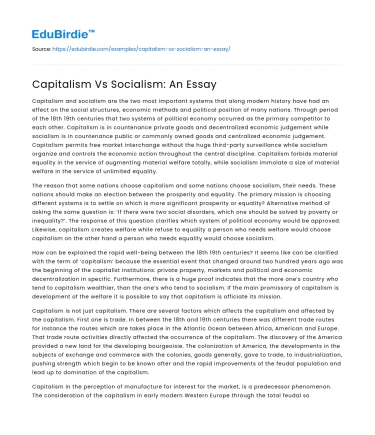Introduction
Capitalism and socialism represent two diametrically opposed economic paradigms that have shaped global socio-economic landscapes. Capitalism, characterized by private ownership and market-driven economies, promotes individualism and economic liberalism. In contrast, socialism advocates for collective ownership and state intervention, striving for social equity and wealth redistribution. The ideological clash between these systems has fueled political debates and influenced policy-making across the globe. The purpose of this essay is to critically examine the fundamental principles of capitalism and socialism, assess their implications on economic growth and social welfare, and explore how these systems have been implemented in various contexts. Through a balanced analysis of both paradigms, we can better understand their strengths, weaknesses, and the nuances that have shaped contemporary economic thought.
Economic Growth and Distribution of Wealth
Capitalism is often lauded for its ability to drive economic growth and innovation. The competitive nature of market economies incentivizes entrepreneurship, leading to advancements in technology and increased productivity. Adam Smith, in his seminal work "The Wealth of Nations," argued that the invisible hand of the market effectively allocates resources and fuels economic prosperity. The United States is a quintessential example, where capitalism has led to unprecedented economic growth and technological advancement. However, capitalism's emphasis on profit maximization can result in significant wealth disparities. The concentration of wealth among a small elite can exacerbate social inequalities, as noted by economist Thomas Piketty in his book "Capital in the Twenty-First Century."
Save your time!
We can take care of your essay
- Proper editing and formatting
- Free revision, title page, and bibliography
- Flexible prices and money-back guarantee
In contrast, socialism prioritizes the equitable distribution of wealth and resources. By advocating for state control and collective ownership, socialist economies aim to reduce the wealth gap and promote social welfare. Countries like Sweden and Denmark have implemented social democratic models that combine market economies with extensive welfare systems, resulting in low poverty rates and high standards of living. However, critics argue that excessive state intervention can stifle innovation and economic efficiency. The former Soviet Union serves as a cautionary tale, where centralized planning led to economic stagnation and bureaucratic inefficiencies. While socialism's commitment to equity is commendable, its practical implementation often faces challenges in maintaining economic dynamism.
Social Welfare and Individual Freedom
The debate between capitalism and socialism extends beyond economic metrics to encompass social welfare and individual freedoms. Capitalism, with its foundation in liberal democracy, champions individual rights and personal freedom. The autonomy to own property and pursue personal interests is intrinsic to capitalist societies. However, critics point out that unfettered capitalism can lead to exploitation and social injustice. The lack of adequate safety nets can leave vulnerable populations at the mercy of market forces, as evidenced by the 2008 financial crisis, which disproportionately affected low-income individuals.
Socialism, on the other hand, emphasizes collective well-being and social justice. By providing universal healthcare, education, and social services, socialist policies seek to ensure basic needs are met for all citizens. The Nordic countries exemplify how socialist principles can coexist with democratic governance, leading to high levels of social welfare and public satisfaction. Nevertheless, the balance between individual freedom and state control remains contentious. Critics argue that excessive regulation and state oversight can infringe on personal liberties and stifle entrepreneurial spirit. The challenge lies in finding a middle ground where social welfare does not come at the expense of individual freedoms.
Challenges and Adaptations in a Globalized World
In the context of globalization, both capitalism and socialism face new challenges and opportunities. Capitalist economies benefit from global markets and cross-border investments, driving economic growth. However, globalization also exacerbates income inequality and leads to the exploitation of labor in developing countries. The rise of multinational corporations raises questions about accountability and ethical business practices. Meanwhile, socialist policies must adapt to the demands of a global economy. The integration of technology and innovation within socialist frameworks is crucial to remain competitive while maintaining social welfare standards.
Hybrid models that combine elements of both systems have emerged as pragmatic solutions. China's economic model, often described as "socialism with Chinese characteristics," combines state control with capitalist market practices, resulting in rapid economic growth. Similarly, the Nordic model blends free-market capitalism with comprehensive welfare systems, achieving both economic prosperity and social equity. These examples highlight the potential for adaptive approaches that transcend ideological boundaries, addressing the complexities of modern economies.
Conclusion
The discourse on capitalism versus socialism is not merely an academic exercise; it has profound implications for policy-making and societal development. Both systems have their merits and drawbacks, shaped by historical contexts and cultural values. Capitalism's potential for economic growth and innovation is counterbalanced by concerns over wealth inequality and social justice. Conversely, socialism's focus on equity and social welfare faces challenges in economic efficiency and individual freedoms. As the world navigates the complexities of globalization and technological advancement, hybrid models offer promising pathways that integrate the strengths of both ideologies. Ultimately, a nuanced understanding of capitalism and socialism can inform balanced approaches to foster sustainable development and social well-being.






 Stuck on your essay?
Stuck on your essay?

